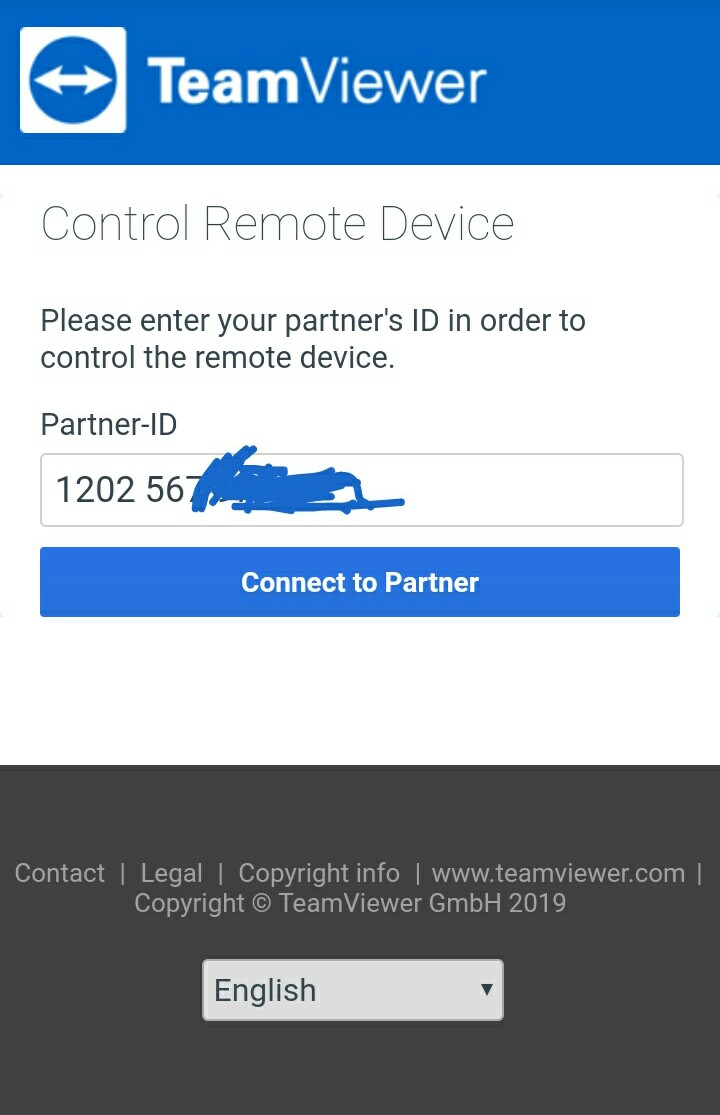

- #Teamviewer quick support your partner rejected how to
- #Teamviewer quick support your partner rejected full
#Teamviewer quick support your partner rejected full
Safety Wing, according to its homepage, is “here to remove the role of geographical borders as a barrier to equal opportunities and freedom for everyone”.īut the realities of life as a digital nomad, and the dream of shedding your nationality for a borderless, paperless version, are full of day-to-day complications, as I have discovered – particularly if you do not belong to the young, white and western stereotype that the media tends to perpetuate.

Plumia is owned and staffed by Safety Wing, an HQ-less insurance company which sells travel and health cover to digital nomads and remote working teams (tagline: “Insurance for nomads by nomads”). The concept of creating an internet country was dreamt up during a company hackathon. Our vision is to upload the nation state to the cloud.” To Razavi, membership of a nation state “offers incredibly poor value … The aspects that are really stuck in the past include citizenship, passports and tax. Having consigned the office to the trash, it makes sense that the nation state is the next institution that digital nomads want to recycle. Remote-work visas will shape the future of work, travel and citizenship “ Zoom towns” are another trend, with towns such as Augusta, Maine in the US offering financial sweeteners to attract remote workers. Countries such as Barbados, Estonia and Portugal started issuing remote work visas to encourage geographically flexible employees to relocate to their territories. Workplace norms toppled like dominos: the office, in-person meetings and the daily commute fell first. But the pandemic quickly proved remote work was possible for many more people. The Insights team generates long-form journalism and is working with academics from different backgrounds who have been engaged in projects to tackle societal and scientific challenges.īefore COVID struck, 12% of workers in the US worked remotely full time, and 5% in the UK. This story is part of Conversation Insights Yet now, the remote working revolution triggered by the pandemic has given this borderless lifestyle “project” a new impetus. Pre-pandemic, the popular stereotype was of a carefree millennial who had escaped the daily grind to travel the world without hindrance, working on a laptop in some far-flung beach cafe with their only limitation being the quality of the wifi.Īs long ago as 2015, I was hearing recurring complaints from these nomads about the ideological and practical frictions that nation states pose – it just hadn’t organised itself into a movement yet.įor a while, COVID-19 appeared to put the brakes on the nomadic dream, as most were forced to head home to western countries and the safety net of healthcare systems. Photograph: Barbara Jovanovic, Author provided Freedom for everyone?Īs an anthropologist, I have been chronicling the digital nomad lifestyle – and their tangled relationship with state institutions – for the past seven years. Lauren Razavi, executive director of Plumia. You can listen to more articles from The Conversation, narrated by Noa, here. “We’re all enrolled into this automatic subscription based on the coincidence of our birthplace or our heritage, and that really doesn’t work in the 21st century.” Born in Britain to an Iranian immigrant, Razavi sees herself as untethered and borderless, and likens national citizenship and tax to a “subscription” that is very hard to cancel. Razavi is the executive director of Plumia, a self-proclaimed “moonshot mission” to build an internet country for digital nomads. “The nation state is outdated – it’s based on 19th-century thinking, and we aim to upend all of that,” Lauren Razavi tells me over Zoom from a bustling co-working space. In one case, a new “virtual” country is already in development. It is the latest in a flurry of utopian visions by self-styled digital visionaries, crypto believers and web 3.0 evangelists who are lining up to declare the death of the traditional concept of countries and nationhood.
#Teamviewer quick support your partner rejected how to
In June 2022 Balaji Srinivasan, former chief technology officer of the Coinbase cryptocurrency exchange, published an ebook entitled The Network State: How To Start a New Country. The people are spread around the world in clusters of varying size, but their hearts are in one place. A ‘network state’ is ideologically aligned but geographically decentralised.


 0 kommentar(er)
0 kommentar(er)
